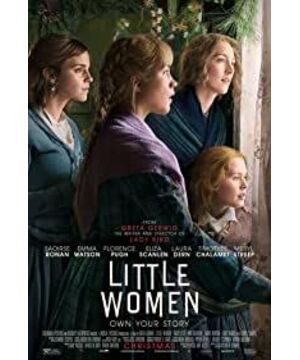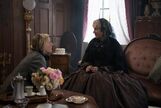Four and a half stars, if you put your personal preference into it, you can even give a good rating of 4.7 (after all, there are not many movies that make me cry at this age).
Feminism is not a stereotyped unconventional or traditional label image, nor is it an object projected behind a male-centered culture, and these are the routines of traditional feminist films. formula. I personally think that the true meaning of feminism should be the true meaning of self-knowledge, self-liberation, self-pursuit, and self-loyalty. Only in this way can women transform from the traditional bearers of social expectations to the creators of their own destiny. In this film, it can be discussed from two directions of character image and plot change.
Do women have to get married and have children? Of course not, jo chose the freedom of being single, and chose to pursue her dream of being a writer. When women could only rely on marrying a good person to maintain a quality life, they went to New York alone to earn money to support the family; In the society of skirts, he decides to cut off selling money and sponsor his mother alone; when a "high, rich and handsome" soul mate proposes, he resolutely says no; when he gets the property left by his aunt, he does not parasitize on the inheritance Instead, he founded a school; in the face of bargaining from publishers, as a girl who likes money, he chose to give up the copyright of 500 dollars without hesitation... What's more valuable is that the director did not portray jo as a stereotyped independent female image , I would hide and cry alone at night if I lost my long golden hair. After I chose to pursue myself, I would cry in front of my mother because of loneliness. After rejecting Laurie, I found that Laurie and Amy were already engaged, but jo did not choose to stop. Here, she has fulfilled her mother's expectations for her - not just being patient with life, but finding her own way of balance and continuing to pursue the life she wants. Such a full image is really precious.
Isn't marriage and childbirth necessarily not women's liberation? Of course not, Meg, who was born in a middle-class family, had outstanding acting talent—talent was often a sign of a successful man in the male society at that time, although he was dazzling in high-class balls and could marry into a "rich family", although his own The person she loves can't give her the material life she wants or even her original standard of living, but she still chooses to marry her true love. But meg is also human, and the director also gave her a complete image. Who says that even if a woman chooses love and gets married, she must forbear and dedicate herself to being the Virgin? Meg will also buy skirts that her family's financial strength cannot bear because of other people's eyes and instigation, but in the end Meg breaks through herself again and chooses the person she loves.
Do you have to be greedy and vain to marry a rich man and live a high life? Of course not, because of this, Amy in the original book is the least popular among the four sisters, but in this movie, the director gave Amy new life and thinking in his own way. First, the story in the original book is linear, so readers can easily accept LJ's CP concept before reading the story of laurie and jo getting to know each other, knowing that laurie and jo broke up, and after amy and laurie got engaged. But in the movie, on the one hand, the director first flashbacks the fact that jo refused laurie, and then flashes back to LJ's story, thus breaking the psychological expectation that LJ must be together; on the other hand, the director also let Amy face to face in the studio Laurie defended herself. Amy also wanted to be a successful painter, but she didn't have enough talent, but she still wanted to live a good life. At that time, only the support of her husband could get substantial financial support. At the same time, Amy thought about it. Good days are also expected to support the family's difficulties through their own wealth, but even so, Amy finally rejected the wealthy Fred, which gave Amy a certain moral position. Especially at the end of the film, when I took Laurie home and had a showdown with Jo, I was worried that Jo couldn't be forgiven emotionally and the emotional contrast after getting Jo's understanding and blessing pushed Amy's image to a climax.
Is it necessary to be loyal to the family and live a small life without value? Of course not, even Beth, who has always been unknown and weak, is "the best of us" in Amy's mouth, because Beth cured Mr. Lawrence's thoughts of his daughter with his piano and shoes made by himself, and used his own feelings for poor families. Kindness has fulfilled the expectations of parents for their children, used his little remaining life to inspire jo to resume writing, and used the end of his life to once again unite the entire family.
Except for the four sisters, the one who moved me and was willing to write two more sentences was Mrs. March, especially as a mother, when her father went to the battlefield and the father's role was missing, she chose to endure everything alone and gave her All the support and love from the four sisters, such as the calm patience outside the gate at Christmas, such as agreeing to let meg go out to the dance in those days, such as letting jo find a balanced way of being unhappy with life, such as when jo is blurred by loneliness When he was in love with Laurie, he insisted that jo think about whether he loved Laurie. For example, he showed empathy and principle in the face of aunt's remarks that there was only Amy in the family. This is undoubtedly an educational concept and method that is missing in today's society.
There is also Aunt March. The most interesting thing is that, as a full-fledged realist, although he keeps saying that the most reliable thing about this family is that Amy can marry a good person, he has never been married in his life. What is even more amazing is that he still lives after his death. The house is left to jo. These are worth thinking about and intriguing.
After talking about the characters, finally talk about the plot adaptation. As mentioned above, the original book is a linear narrative, and the movie is a cross-double narrative. Different tones are used to distinguish the warm and brisk seven years ago and the cold and low saturation seven years later. The selection of editing points is also just right, and the excess is naturally clear. In contrast, I also feel quite strange to hear someone next to the movie theater say that they can't tell the time period. When the two lines are intertwined to the end, some people may think that this is an open ending, and I think that people who have such thoughts should watch it again until they understand it. Personally, I like the director's handling of the ending for two reasons. In terms of content, most directors' solutions to real dilemmas will be projected on dreams, literary and artistic works, surreal processing, etc., but the director has gone a step further on the basis of the original work, making jo face the society and difficulties directly, With the face-to-face bargain of myself and the publisher and the publication of the final book, as the final result of women's growth and self-realization, I personally think that this kind of treatment is more meaningful than the sad ending of women's pursuit of true love or social struggle; in terms of form , maybe it is my personal preference and judgment criteria, any good art must learn to leave blank, especially modern art forms, if the creator is a creation, then the audience is a second creation, the combination of virtual and real gives the viewer imagination and Only by giving full play to the space can the works interact with the viewers, the works can express themselves to the greatest extent, and the viewers can obtain the greatest ideological impact. Only in this way can the works be applauded. Going back to this movie, I thought that what the director did was actually a closed ending with a lot of blank space, and died through the dialogue between the publisher and jo. Under the umbrella is the happy ending in the novel, but then used high-saturation colors. , Dreamy footage interspersed with editing the production process of Little Women's publishing, jo watching the book production process with a smile outside the pane, and the happy life of the March family, and finally ended with the completion of the book cover production, echoing the title. This way of expression is in sharp contrast with the previous article, when the image of women is expressed, clearly and clearly speaking for himself and daring to act. There is no dialogue between the characters, but the picture shown explains everything. The so-called silence is better than the voice at this time.
View more about Little Women reviews











